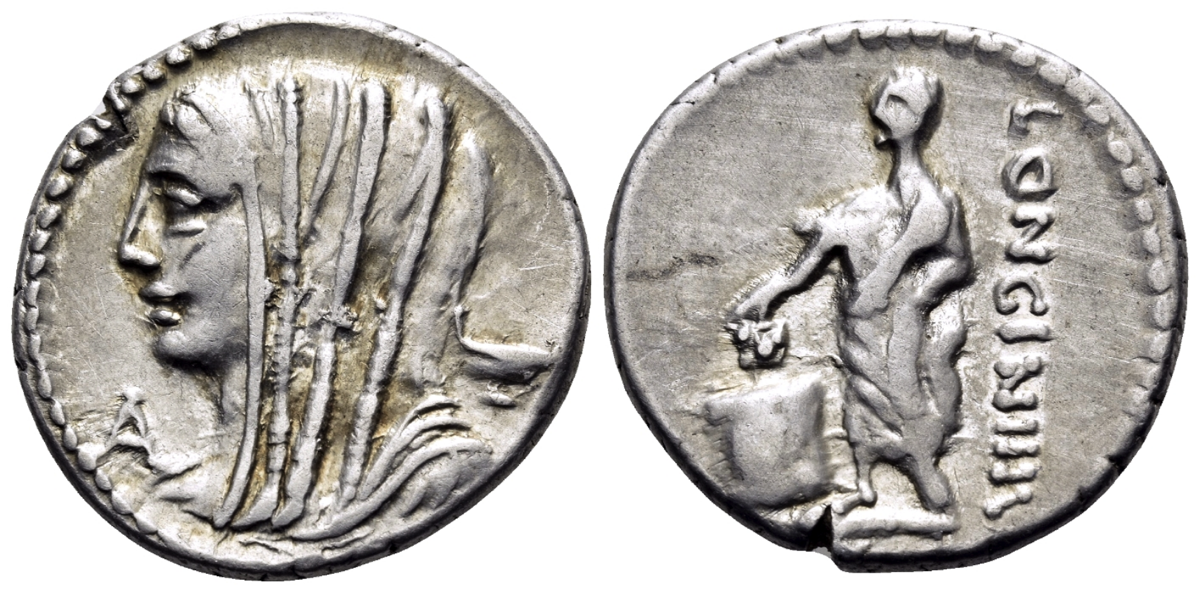L. Cassius Longinus, 60 B.C.
Left: Veiled and diademed head of Vesta
Right: Voter dropping tablet marked V into a cista

Lucius Cassius Longinus was the brother of Gaius Cassius Longinus, later famous as one of Julius Caesar’s principal assassins.
He was elected moneyer for 60 BC (to oversee the minting of coins). As was usual in Roman Republican times he used his magistrature to promote the importance of his family and famous ancestors. He chose L. Cassius Ravilla, Consul (127 BC) who proposed a new method of jury voting by secret ballot.
Known as the Lex Cassia Tabellaria, it provided that in most court cases tried by jury, jurors could mark their verdict on a small tablet and drop it into a basket to be counted by a court official. The practice was also extended to voting on laws in the people’s assemblies, the Comitia Tributa and the Concilium Plebis.
The coin highlights the Trial of the Vestal Virgins of 113BC conducted by a special commission presided over by Ravilla. The V on the tablet stands for VTI ROGAS, 'I approve'. Three vestals were accused of breaking their vows of celibacy. The ancient Romans believed the failure of the Vestal Virgins to maintain their vows could lead to a massive defeat of the Roman Army and the destruction of Rome. The offenders and their partners were found guilty and condemned to death.
Cicero considered Ravilla important and refers to him in his speech for Sextus Roscius as the first man who asked the question 'cui bono?' in lawsuits.
"Cassius ille quem populus Romanus verissimum et sapientissimum iudicem putabat identidem in causis quaerere solebat 'cui bono' fuisset. Sic vita hominum est ut ad maleficium nemo conetur sine spe atque emolumento accedere."
"That Cassius, whom the Roman people thought to be the truest and wisest judge, used to ask repeatedly in cases 'whose good' it would have been. The life of men is such that no one would attempt to do evil without hope of profit."
Cicero, Pro Sexto Roscio Amerino, 84.
He was elected moneyer for 60 BC (to oversee the minting of coins). As was usual in Roman Republican times he used his magistrature to promote the importance of his family and famous ancestors. He chose L. Cassius Ravilla, Consul (127 BC) who proposed a new method of jury voting by secret ballot.
Known as the Lex Cassia Tabellaria, it provided that in most court cases tried by jury, jurors could mark their verdict on a small tablet and drop it into a basket to be counted by a court official. The practice was also extended to voting on laws in the people’s assemblies, the Comitia Tributa and the Concilium Plebis.
The coin highlights the Trial of the Vestal Virgins of 113BC conducted by a special commission presided over by Ravilla. The V on the tablet stands for VTI ROGAS, 'I approve'. Three vestals were accused of breaking their vows of celibacy. The ancient Romans believed the failure of the Vestal Virgins to maintain their vows could lead to a massive defeat of the Roman Army and the destruction of Rome. The offenders and their partners were found guilty and condemned to death.
Cicero considered Ravilla important and refers to him in his speech for Sextus Roscius as the first man who asked the question 'cui bono?' in lawsuits.
"Cassius ille quem populus Romanus verissimum et sapientissimum iudicem putabat identidem in causis quaerere solebat 'cui bono' fuisset. Sic vita hominum est ut ad maleficium nemo conetur sine spe atque emolumento accedere."
"That Cassius, whom the Roman people thought to be the truest and wisest judge, used to ask repeatedly in cases 'whose good' it would have been. The life of men is such that no one would attempt to do evil without hope of profit."
Cicero, Pro Sexto Roscio Amerino, 84.